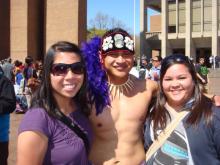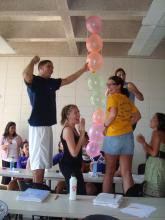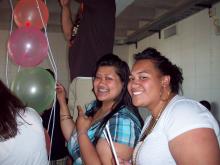This past spring the Department of Anthropology offered a new course, Building Pacific Islander Leadership(Anth 469). Three Pacific Islanders from campus joined Dr. Holly Barker, from the Department of Anthropology, to develop and teach the course: Ink Aleaga (Athletic Department), Alejandro Espania (Office of Minority Affairs) and Kiana Fuega, a graduate from UW’s Anthropology Program. The class highlighted the efforts that indigenous scholars and local community leaders from the Pacific Islands make in addressing the challenges faced by their communities, whether in the islands or in the United States.
At the beginning of each week, a speaker from one of the local Pacific Islander communities came to campus to share personal perspectives about one of the many topics covered in the class. These included colonialism, family, land, dance and music, the role of the church, gender, sports, military, youth, and education. For example, Eddie Maiava brought a ukulele to class to perform traditional Samoan songs, and to demonstrate how Pacific Islander immigrants adapt these songs for use in the United States to help parents teach their children about their culture. Another speaker, Jill Otake from the King County Prosecutor’s Office, explained the challenges Pacific Islanders face in the judicial system when judges and juries fail to understand how culture impacts human behavior; Ms. Otake offered to help students from the class prepare for the LSAT exam, should they decide to pursue the law as a career option. Students, working in groups, took turns to become class “experts” on the topic of the week, and to work closely with the guest speakers who acted as mentors for the students.
Later in the week these student leaders led class discussions about the implications of the speakers’ knowledge for students and the University. They considered the role students could play in cultivating Pacific Islander leadership and preparing indigenous leaders to address challenges faced by their communities. Group projects included creating leadership and teamwork development projects (seen in the photo with the balloons and straws), analyzing contemporary Pacific Islander music and how it creates negative images of women that hinder their success, and discussing the role of the media in perpetuating stereotypes about Pacific Islanders and gangs.
Through readings, lectures, and class discussions, students explored why the recruitment and retention of Pacific Islander students on campus is the responsibility of everyone, not just of Pacific Islanders. Students had an opportunity to develop leadership skills by working closely with community mentors, and by volunteering time with Pacific Islander student groups on campus. Inviting community members to campus also strengthened links between the University and local Pacific Islander communities.
Based on the course evaluations, all students – whether Pacific Islanders or non-Pacific Islanders – found the course extremely beneficial, many saying that it was the best, and most useful, course they had ever taken. The department greatly appreciates the vital roles Mr. Aleaga, Mr. Espania and Ms. Fuega played in developing and implementing the experimental class. Without their help, as well as the participation of our community partners, the course would not have been possible.
Photo captions from top to bottom:
Photos 1: The class required students to volunteer with Pacific Islander student organizations, such as the groups that organized “PolyDay,” an annual event in the spring to raise awareness about Pacific Islander cultures (left to right: Marizon Cruz, Stalindaniel Uele, Jessalyn Quitugua)
Photo 3: Natalie Santos (l.) and Apa’Auoletalalelei Talalemotu (r.) during the leadership development activity


